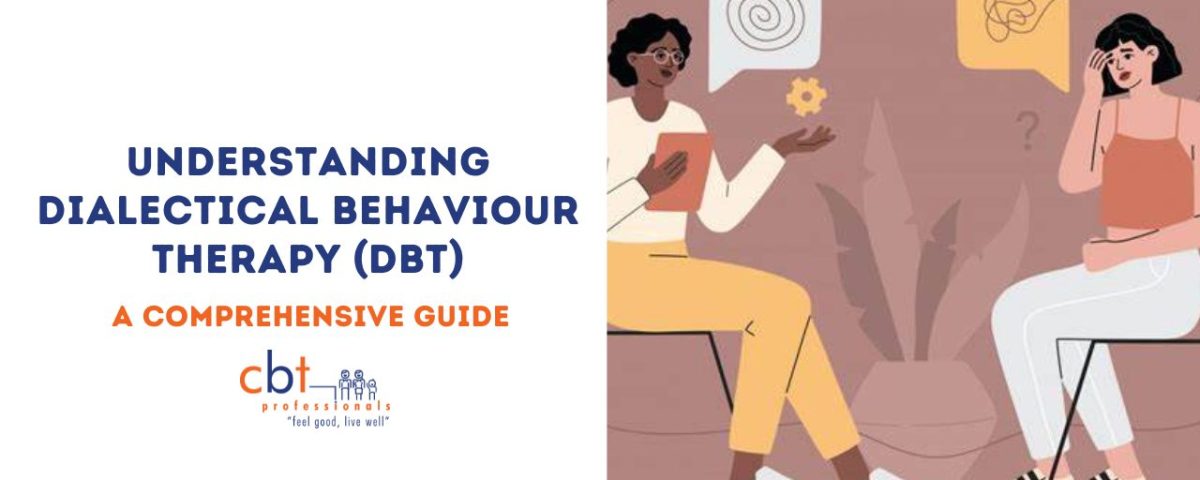Understanding Dialectical Behaviour Therapy (DBT): A Comprehensive Guide
Dialectical Behaviour Therapy (DBT) is a powerful and versatile form of psychotherapy designed to help individuals manage intense emotions, develop healthy coping mechanisms, and improve interpersonal relationships. Developed by psychologist Marsha M. Linehan in the late 1980s, DBT was originally intended for treating Borderline Personality Disorder (BPD). However, its applications have since broadened to include a variety of mental health conditions such as depression, anxiety, substance abuse, and eating disorders. This blog aims to provide a comprehensive overview of DBT, its core components, and its benefits.
The Foundations of DBT
DBT is rooted in cognitive-behavioural therapy (CBT) but incorporates elements of mindfulness and acceptance strategies. The term “dialectical” reflects the synthesis of two opposing ideas: acceptance and change. DBT teaches individuals to accept their current experiences and emotions while simultaneously striving to change unhealthy behaviours and thought patterns.
The Four Modules of DBT Skills Training
DBT skills training is a cornerstone of therapy, equipping individuals with practical tools to manage their emotions and behaviours. Here is an in-depth look at the four modules:
1. Mindfulness
Mindfulness is the practice of being fully present and aware in the moment without judgment. This module teaches individuals to observe their thoughts and feelings without becoming overwhelmed by them. Key skills include:
- Observing: Noticing internal and external experiences without trying to change them.
- Describing: Putting words to what one observes, such as emotions, thoughts, or physical sensations.
- Participating: Engaging fully in activities with a focus on the present moment.
2. Interpersonal Effectiveness
This module focuses on helping individuals navigate relationships and interact with others in a healthy and constructive manner. Skills taught in this module include:
- DEAR MAN: A technique for making requests and saying no. The abbreviation is Describe, Express, Assert, Reinforce, Mindful, Appear Confident, and Negotiate.
- GIVE: A method for maintaining relationships, standing for Gentle, Interested, Validate, and Easy Manner.
- FAST: A strategy for maintaining self-respect, standing for Fair, Apologies (keeping them minimal), Stick to values, and Truthful.
3. Emotion Regulation
Emotion Regulation skills help individuals understand and manage their emotions, reducing emotional vulnerability and suffering. Key skills include:
- Identifying and Labelling Emotions: Recognising and naming emotions accurately.
- Reducing Vulnerability: Taking care of physical health, sleep, diet, and exercise to reduce emotional sensitivity.
- Opposite Action: Acting opposite to emotional urges when they are not justified by the facts.
4. Distress Tolerance
Distress Tolerance skills are crucial for managing crises without resorting to harmful behaviours. These skills include:
- TIPP: Techniques for quickly reducing intense emotions, standing for Temperature, Intense exercise, Paced breathing, and Progressive muscle relaxation.
- Distracting: Engaging in activities, contributing, and comparing oneself to others as a way to divert attention from distressing emotions.
- Self-Soothing: Using the five senses to calm oneself.
The Benefits of DBT
DBT offers numerous benefits, making it a highly effective treatment for various mental health conditions. Some of the key benefits include:
- Reduction in Self-Harming Behaviours: DBT is particularly effective in reducing self-injurious behaviours and suicidal ideation, especially among individuals with BPD.
- Improved Emotional Regulation: Clients learn to manage intense emotions more effectively, reducing mood swings and emotional instability.
- Enhanced Interpersonal Skills: DBT helps individuals develop healthier relationships by improving communication, assertiveness, and conflict resolution skills.
- Better Coping Mechanisms: The skills taught in DBT provide individuals with practical tools to cope with stress and distressing situations without resorting to harmful behaviours.
- Increased Self-Awareness: Mindfulness practices foster greater self-awareness and acceptance, helping individuals live more authentically and consciously.
Who Can Benefit from DBT?
While DBT was initially developed for individuals with BPD, it has proven effective for a range of other mental health conditions, including:
- Depression: DBT can help individuals with depression by teaching skills to manage depressive symptoms and improve overall mood.
- Anxiety Disorders: The mindfulness and emotion regulation skills in DBT can be beneficial for managing anxiety.
- Substance Abuse: DBT’s focus on distress tolerance and emotion regulation makes it an effective treatment for substance use disorders.
- Eating Disorders: DBT can help individuals with eating disorders develop healthier coping mechanisms and improve their relationship with food.
Dialectical Behaviour Therapy is a comprehensive and adaptable treatment that offers a lifeline to individuals struggling with intense emotions and maladaptive behaviours.
By integrating cognitive-behavioural techniques with mindfulness and acceptance strategies, DBT provides a robust framework for personal growth and emotional stability. Whether you are dealing with BPD, depression, anxiety, or other mental health challenges, DBT can empower you with the skills needed to navigate life’s difficulties and build a more fulfilling and balanced life. If you or someone you know could benefit from DBT, consider reaching out to us at CBT Professionals to explore this transformative therapeutic approach.
Reach out today, we are here to help!
Helensvale: (07) 5551 0251
Mount Gravatt: (07) 3102 1366
Nerang: (07) 5668 3490
If you, or someone you know, require help, please reach out to organisations like Beyond Blue.
Additionally reach out to these organisations that may be able to help.
- ReachOut (youth mental health service) — online help
- SANE Australia — call 1800 187 263
- Mental Illness Fellowship of Australia (MIFA) — call 1800 985 944
- LifeLine 13 11 14 — for anyone in crisis
(Health Direct, 2020).
If this is an emergency, please contact 000 or visit your local emergency department.
Disclaimer: Content on this website is provided for education and information purposes only and is not intended to replace advise from your doctor or registered health professional. Readers are urged to consult their registered practitioner for diagnosis and treatment for their medical concerns.
THREE CONVENIENT LOCATIONS
MOUNT GRAVATT
Mt Gravatt Medical PrecinctSE 105, 1808 Logan Rd
Upper Mount Gravatt QLD 4122


